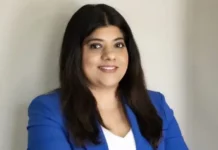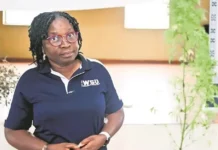We’re highlighting some of the Women Cannabis Trailblazers in the Hudson County area and asking what they think about the Legal Cannabis Industry and how women will fit into it. Read on for a list of incredible women to see how they’ve survived and thrived within the Cannabis Industry in Hudson County.
Chelsea S. Duffy | Co-founder & CEO of Loca Modiv
Hoboken Girl: What inspired you to begin your career in the marijuana industry?
Chelsea Duffy: I’ve been a cannabis consumer both medically and recreationally for quite some time. I became loyal to the plant when I learned it could medicinally treat my all-consuming endometriosis. Instead of relying on painkillers, I’d ingest THC and/or CBD and I was able to get out of bed, work a normal day, and sleep well. Believing in the therapeutic properties of the plant, I started searching for creative ways to work within or alongside cannabis.
Back in 2015, I was on the founding team of the Emojiuana Kush Keyboard App, a canna-keyboard that provided 420 friendly emojis. And while it was exciting to find footing in the industry, it just wasn’t enough. I started to educate myself on the social injustices at hand and the extreme inequalities going on within the market and it was incredibly concerning but also motivating. Having a decade-long career in corporate sports, I learned what it meant to work for an “old boys club” and my blood boiled at the thought of such happening within the coming cannabis boom (here in NJ). It was then I decided to redirect and devote my time towards something socially conscious: the medical cannabis expansion. And I’ve been chugging along ever since….
HG: How long have you worked at/owned a business in this industry?
CD: I’ve been working in the (cannabis) industry since 2015. My company, Local Modiv, was founded in early 2018 and we applied for a medical dispensary in Jersey City, August 2019. We did not win a license due to lack of property which was required at the time. We’ve since transitioned into the recreational space and applied for a conditional, tier 5 license in March 2022.
HG: What is your specialty within this industry? Tell us about your business (please feel free to give details!).
CD: Local Modiv is a tier 5 dispensary applicant so our speciality once licensed will be catering to cannabis consumers by way of a safe, fun, and educational retail experience. We’ll provide a variety of locally sourced craft cannabis as well as strains from statewide cultivators. We’ll be bringing Jersey City something they’ve never seen before as our build-out calls for a modern interior with an upscale, psychedelic twist. Transitioning from the medical to recreational side of the business, we’re well versed in the plant’s medicinal properties and look forward to educating existing patients of the NJMMP to the regular shopper. Outside of our shop, our speciality lies in the name. We’re a locally-motivated business driven by community ambitions. We want to contribute to the town we live and work in and want to see dollars spent in JC filtered directly back into JC.
HG: What advice would you give anyone trying to enter into this industry?
CD: For anyone looking to enter the industry, I would advise on first figuring out which part of the industry most interests you. Is it cultivation? Manufacturing? Lab testing? Production? Legal? It’s endless. Much like any big industry, there’s a job for everything, even sanitation. Once you find your focus, become familiar with your town’s take on cannabis. Though your state legalized it, your town might not have. So go where you’re celebrated. From there, it’s time to network like you’ve never networked before. One thing is for sure – it’s community over competition in this industry and you cannot succeed in this alone. Through events and meeting new people, you’ll find your footing. Connecting with ideal partners, investors, and supporters that you can trust is key it’s everything. Lastly, don’t be naive, just because you’re a woman and/or minority does not mean you’re getting a leg-up, it means you have to fight twice as hard, you’ve just finally invited to the conversation.
HG: How important do you think having diverse representation within this industry is and why?
CD: It’s surpassed importance, it’s everything. Especially in the nation’s most diverse city in the country! Cannabis businesses need to be reflective of the towns they set up shop in. Industry leaders stand to make millions of dollars. Those dollars should be going into the pockets of the individuals that: 1. Maintained the marketplace up until now, 2. Have been convicted or in-prisoned for cannabis distribution/sales in the past, 3. Those residing in impact zones looking for job opportunities that are usually not available to them, 4. The list goes on… This new legal market gives us a chance to rectify some of the systemic failures of our country, but we’re responsible for making it happen.
Chirali Patel | Founder and Managing Partner of Blaze Law Firm and Founder and CEO of Blaze Responsibly™
Hoboken Girl: What inspired you to begin your career in the marijuana industry?
Chirali Patel: There were a few inspirations that led to me being on this journey. Most importantly, the plant has helped many loved ones, both alive and above, more than prescription medications ever did. As a patient and consumer myself, I have had an appreciation and love for the plant for well over a decade. The medicinal value of this natural herb has so much potential that we have yet to discover and the desire to stay informed and be a part of the green revolution is near to my heart. My prior work as a prosecutor also gave me firsthand experience into the broken, and unfortunately, racist criminal justice system. I saw how cannabis was utilized as a way to criminalize people of color and place them into a repetitive cycle with no good ending in sight. I knew early on I had to utilize my degree to benefit those individuals most underserved and work on reforming the system in every possible way. I care about making sure the right people, the deserving ones, are allowed into this industry to build legitimate generational wealth.
HG: How long have you worked at/owned a business in this industry?
CP: I have been involved in education and advocacy in this industry since 2016, ideated my businesses in 2018, and ultimately launched them in 2020.
HG: How do you feel about legalization in New Jersey, and the current Marijuana industry here in Hudson County?
CP: I see the potential New Jersey has in becoming a leader in market trends and setting the stage for equitable licensing. Thus far, the conditional licensing process permitted by the Cannabis Regulatory Commission has been fair and transparent. The CRC is providing avenues for small entrepreneurs and social equity applicants to obtain conditional licenses. What is out of their control and sadly the barrier to ultimate success is the ability of these applicants to secure real estate and obtain funding. I hope the State legislature can curtail the predatory practices taking place and utilize tax revenue being generated to create funds eligible applicants can access for real estate and operational expenses. New Jersey is home to many MSOs but with the future adult-use operators entering the space, I am optimistic the market demands will dictate and micro and diverse businesses can flourish.
HG: What is your specialty within this industry? Tell us about your business (please feel free to give details!).
CP: My specialty is cannabis law and education. As an attorney and solo practitioner, Blaze Law Firm is a boutique cannabis firm. Since its inception in January of this year, my clients, current and former, have been awarded conditional licenses in every round of awards to date, and I represent 2019 RFA medical license winners and out of state operators. I built social equity into my law firm from day one by making a commitment that I would work with at least 1 social equity applicant pro bono per quarter – I currently represent 3 — 2 of whom served time for cannabis-related offenses. I help clients throughout the entire cannabis licensing process in addition to corporate formation, real estate transactions, trademarks, etc. Through Blaze Responsibly™, I take the experiences I have working in government, legal, and cannabis and share what I’ve learned via content to educate the community at-large. It’s only in its beginning phase, but the trajectory is for the company to be a public resource center where you get the facts and tools you need to succeed in this industry as a responsible socially aware business or consumer.
HG: What advice would you give anyone trying to enter into this industry?
CP: Find your passion first. Ask yourself why you’re entering this industry and what your goals are before blindly diving in. While it’s one of the most welcoming industries, it can also get overwhelming. There are endless opportunities in the ancillary markets and plant-touching side — so think about what type of work you love and you can make it happen. Be ready to make the investment in educating yourself about the history of legalization, international markets, regulatory compliance, etc. Things are constantly changing and you want to stay on top of the innovation and trends so constant education is key. Ask questions and do your due diligence whenever opportunities come your way. Lastly, trust yourself, invest in yourself, and go with your intuition – you know what’s best.
HG: How important do you think having diverse representation within this industry is and why?
CP: Diverse representation is extremely important because this plant is indigenous to people of color and countries and communities that have celebrated cannabis for millennia. Our people need to be at the table when decisions are being made — in the legislature, in the boardroom, in the cultivation facility. When you lack representation, you miss an entire perspective and voice that is necessary to seeing the full picture. We need more women and diversely-owned businesses in this industry period. The industry needs to be reflective of the community it serves and also those that built it on their back – the ones who bore the brunt of the war on drugs, specially cannabis and the families and communities impacted by it.
Shayla Cabrera | Owner and Founder of Tiaplanta
Hoboken Girl: What inspired you to begin your career in the marijuana industry?
Shayla Cabrera: My business began as a houseplant shop rooted in community, diversity, and education. As someone who has grown every kind of plant, I knew I wanted to bring these same values to legal cannabis. Luck came my way and Tiaplanta was randomly scouted by a large scale commercial cannabis grower from another state that wanted to partner with me and open a new legal cannabis business in New Jersey. I decided to self fund the endeavor and pursue the license on my own without having to give away any equity.
HG: How long have you worked at/owned a business in this industry?
SC: I was officially granted a license to cultivate cannabis in the state of New Jersey in March 2022; however, I’ve been a horticulturalist for about 6 years.
HG: How do you feel about legalization in New Jersey and the current Marijuana industry here in Hudson County?
SC: It has been a long, drawn out process to try to ensure social equity but I am so happy to see legalization of cannabis finally coming to my home state. We are still fighting for small businesses and minority-owned businesses to enter the new market. It was quite disappointing to see that the first dispensaries and the cannabis being sold are owned by large out-of-state corporations. The state and municipalities do not make it easy to acquire one of these coveted licenses. So much that even now as a current license holder I am still struggling to secure a properly zoned location and find the right partners for funding.
HG: What is your specialty within this industry? Tell us about your business (please feel free to give details!).
SC: Here at Tiaplanta, we specialize in growing small batch, craft style indoor cannabis. Our flower is top shelf and grown organically with love. We are a 100% minority- and woman-owned business. We have plans to give back to our community by supporting other small businesses and providing other women and minorities with an avenue to educational resources on how to break into the cannabis market. We aim to maintain full transparency with our customers as we always have.
HG: What advice would you give anyone trying to enter into this industry?
SC: Be relentless in pursuing your decision to enter the cannabis industry. Many will doubt you so believe in yourself. The wave is coming to New Jersey, so any business cannabis-adjacent has great potential to be successful. I’m talking baggies, paraphernalia, design, and social media — the list goes on and on!
HG: How important do you think having diverse representation within this industry is and why?
SC: Having diverse representation in this industry means everything. Black people are disproportionately targeted and incarcerated at higher rates than any other demographic for cannabis. There are still people in jail for this plant while others make millions. Now that the legal market is open, prioritizing giving these lucrative opportunities to those people who were negatively impacted is crucial as an act of social justice.
Jessica F. Gonzalez, Esq. | Cannabis Attorney, Hiller PC
Hoboken Girl: What inspired you to begin your career in the marijuana industry?
Jessica Gonzalez: I have been a consumer of cannabis for over 13 years and I used to joke about one day becoming a cannabis attorney because that is how far-fetched I thought this idea was. I got involved late 2017 as soon as Governor Murphy pledged to legalize adult-use cannabis within his first 100 days. I was a first-year attorney working in the entertainment industry protecting domestic and international trademarks. During this time, I ended up having what one could call an absolute existential crisis about my career path. I knew that if I was going to continue down this legal path, I would need to find an industry that aligned with my spirit. I decided in 2017 that I would dedicate my career to this plant that helped shape me and my level of consciousness. I educated myself heavily on the history of cannabis, attended any cannabis centric event I could, and spoke with anyone who would speak to me. The more I learned about the complex and racist history of cannabis, the more vocal I became. Eventually, I went from an eager audience member to a stage panelist. I leveraged my law degree, my background growing up in a low socio-economic community, and the support of my community to fight for equitable policies.
HG: How long have you worked/ owned a business in this industry?
JG: I’ve worked in the cannabis industry for over 5 years. My first 3 years were spent driving up and down NJ speaking to anyone who would listen to me about the benefits of legalization and the importance of social equity/justice. I’ve spent the last 2 years continuing to advocate for equitable policies on the state and the local level with the introduction of regulations and municipal ordinances. I’ve spent the past year preparing clients to apply for state cannabis licenses with my goal to make sure people of color are given a meaningful opportunity to participate in this industry. At 29 years old, I could see the language I drafted, and my ideas memorialized in NJ’s first adult use cannabis statute, NJ’s first iteration of cannabis regulations and in Jersey City’s cannabis ordinance where I grew up and currently live.
HG: How do you feel about legalization in New Jersey, and the current Marijuana industry here in Hudson County?
JG: It’s not perfect but we are far from where we started. Legalization provided us with a solid foundation to build upon and it has halted the arrests of communities of color. We (advocates) fought hard for years for equitable policies & we were successful on some fronts but not all. We were successful in ensuring no caps on licenses, low application fees, priority system for social equity and diversely owned businesses and non-competitive licensing. Sadly, much of our work is being undone on the municipal level across NJ, and while Jersey City has said that they’re dedicated to ensuring a diverse local cannabis industry, that has yet to be seen. As the most diverse city in the U.S., I hope that Jersey City creates and cultivates a local cannabis industry representative of its diverse community.
HG: What is your specialty within this industry? Tell us about your business (please feel free to give details!).
JG: I provide clients with a range of services, from intellectual property protection to labeling compliance to preparing state cannabis applications and any business transaction in between. Our firm, Hiller PC, assists businesses from the ground up — from entity formation to business transactions to real estate negotiations to selling your company.
HG: What advice would you give anyone trying to enter into this industry?
JG: Get involved! We’re barely scratching the surface of this industry. Learn the people, the history of the plant, and the history of whichever state/country you’re in and their treatment of cannabis. Secondly, learn the rules of the game you’re looking to play. Invest in your own education and show up, consistently. Third, you cannot be a business owner in this industry and not be an advocate. To do so would be a disservice to the industry and everyone who laid the foundation for this industry to evolve.
HG: How important do you think having diverse representation within this industry is and why?
JG: It’s of the utmost importance to ensure that the cannabis community represents the diversity of New Jersey and specifically Jersey City. We must remember that cannabis’ illegality was rooted in discriminatory and racist intent. We must remember this industry was built on the backs of Black, Latino, and Indigenous communities. When over 80% of cannabis businesses are owned by white companies and yet the same percentage of Black, Latino, and Indigenous are incarcerated for the same plant and for a fraction of the cannabis produced by these communities, something must be done to ensure that communities of color are not only able to participate in the regulated cannabis industry but succeed.
Deanna Dominguez | The Hemp Social
Hoboken Girl: What inspired you to begin your career in the marijuana industry?
Deanna Dominguez: I began using Cannabis as a method to manage my anxiety throughout college. Being in the small business world made me realize how many obstacles women are faced with professionally, especially in male-dominated industries. Most times, we are undervalued and viewed as inexperienced; however, women are resilient, and we should not only work to change the stigmas of Cannabis, but the stigmas of Women in Cannabis.
HG: How long have you worked/ owned a business in this industry?
DD: 3 years.
HG: How do you feel about legalization in New Jersey, and the current Marijuana industry here in Hudson County?
I’m excited to be part of a historic transition. I have been able to educate and serve the Jersey City community for almost 2 years now, and the legalization will continue to assist in normalizing Cannabis.
HG: What is your specialty within this industry? Tell us about your business (please feel free to give details!).
DD: I take great pride in educating potential and frequent users on the plant and its benefits. It is important to understand that Cannabis products work naturally. It is crucial to comprehend the different methods of use, extractions, and best practices of Cannabis. Educating consumers will help in ensuring they select the best options for their individual needs.
HG: What advice would you give anyone trying to enter into this industry?
DD: Persevere on the most difficult days and don’t let the opinions of others influence your decisions. I have learned how difficult running and managing a small business can be, but within this industry, we are faced with many hurdles that most others do not experience. Knowing that I am making a positive difference in people’s lives makes it all worthwhile.
HG: How important do you think having diverse representation within this industry is and why?
DD: Diversity gives us the ability to learn and grow by utilizing the various cultural backgrounds and experiences of individuals to broaden the industry. More importantly, diversity grants opportunities to those who may not have a fair chance in this industry.
Rosemarie Moyeno Matos | Law Office of Rosemarie Moyeno Matos LLC
Hoboken Girl: What inspired you to begin your career in the marijuana industry?
Rosemarie Moyano Matos: My work in the cannabis industry started by chance. I was approached in 2018 by a group looking for legal support in structuring their business and preparing legal documents required for an Alternative Treatment Center (ATC) license application. At the time, ATCs only served NJ’s medical patient population, which had grown significantly since Governor Murphy’s election. I was peripherally aware of the NJ’s Medical Marijuana Program as my father, who had passed earlier that year, had been a cancer patient since 2012 and had been offered medical marijuana as a form of treatment for his cancer symptoms many times over the years. Unfortunately for him, my father never availed himself of the medicinal benefits of marijuana for cultural and generational reasons, having been raised to believe that marijuana was a “gateway drug” and seeing how the “war on drugs” detrimentally impacted people of color, like himself, over the years.
Having spent just three short weeks fully submerged in the industry as I worked with my clients on their application, a whole new world opened before my eyes. For the first time in my life, I was able to bear witness to the true power of the plant, not only through the extensive work my clients had already done in the industry but through the impactful testimonials of patients and users I regularly came into contact with. It was not only life changing for me but extremely motivating, having immediately determined that no one else should ever needlessly suffer the pain my father did because of decades of preconceived, unsubstantiated notions deeply rooted in racism and politics. Every day since, my work as a lawyer in this industry has been focused on not only breaking down barriers but trying to level the playing field, in the best way that I can with my skill set, for those most affected by the war on drugs… people of color. Proudly I can say that all of the clients I represent in this industry are diversely owned businesses that qualify as minority or women owned business enterprises or disabled veteran owned businesses. Additionally, a small handful have qualified as social equity businesses despite the stringent qualification standards imposed by the NJ Cannabis Regulatory Commission (CRC).
HG: How long have you worked at/owned a business in this industry?
RMM: I have actively worked in this space since 2018, serving as outside general counsel to license holders and applicants with respect to formation, structuring, licensing, contract negotiations and preparation, banking, insurance, finance, real estate acquisition, regulatory compliance, and land use and zoning matters. Many of my existing clients are licensed cannabis businesses or applicants for recreational cannabis licenses throughout New Jersey and New York. Additionally, in May 2022, I was appointed to serve as the Board Attorney for the City of East Orange’s Board of Cannabis Control. As a result of this recent appointment, I have the benefit of not only working with license applicants on navigating this space but also working with a municipal government in implementing a program that will help applicants achieve the very things our legislature has advocated for in the Cannabis Regulatory, Enforcement Assistance, and Marketplace Modernization Act (CREAMM Act)… a system that promotes social justice reform, social equity, and opportunities for all.
HG: How do you feel about legalization in New Jersey, and the current Marijuana industry here in Jersey City?
RMM: I am cautiously optimistic about legalization in NJ as I closely follow the roll-out of the recreational licensing program. Despite having represented clients who sought licensing in 2018 and 2019, the recreational licensing program established under the CREAMM Act is new and vastly different than the way licensing was performed historically under the MMP. As a result, we are all navigating these uncharted waters the best way that we can following the CRC Rules and any other guidance and direction provided by the CRC. While understanding that establishing and implementing a licensing program of this magnitude is no small feat, there is a still a high level of frustration among applicants and professionals practicing in this space that seven months after the CRC began accepting license applications there is still no clear understanding of the manner in which applications are being processed in light of the review and approval priorities established under the CRC Rules. It makes it extremely difficult for applicants to make informed business decisions in an industry where start-up costs are larger than norm.
I currently represent a few clients applying for licenses to operate cannabis businesses in Jersey City and have had the benefit of navigating my way through their local licensing process. I believe, like many other municipalities that have opted in and are permitting certain cannabis business operations, Jersey City is doing the best that it can with the guidance and direction provided by the CRC. Similar to license applicants, municipalities also have questions and face unanticipated issues as they work through their own local licensing procedures and follow the progression of the state licensing process.
As in any new venture, “kinks” that need to be worked out over time are to be expected. However, for the sake of the applicants who have invested a lot of time and money into this particular business venture, transparency from the governing authorities overseeing state and local licensing is key.
HG: What is your specialty within this industry? Tell us about your business please feel free to give details.
RMM: My specialty within this industry is legal services with respect to cannabis business operations and licensing.
As a practicing lawyer for over 20 years, I have acquired extensive knowledge and experience in a wide range of practice areas, including business, cannabis, insurance, environmental, regulatory compliance, and real estate law. My practice is largely focused on representing entrepreneurs, start-ups, small businesses, and non-profits in a wide range of industries where I offer legal counseling on every aspect of business operations from entity structuring, formation, and permitting/licensing to commercial and real estate transactions, insurance coverage, regulatory compliance and environmental matters, as well as preparing tailored governing documents, contracts, and operating manuals.
Despite being like no other industry currently operating because of the federal law conflict, the basic operating principles of a cannabis business are the same as any other business. The transition into a cannabis practice was very natural for me as a business attorney that has practiced in several highly regulated areas of law throughout my career.
HG: What advice would you give anyone trying to enter into this industry?
RMM: I would strongly advise that anyone serious about entering this space seek the advice of experienced professionals before making substantive business decisions. The CRC Rules are complicated and can be extremely technical. One misstep can wind up costing you a lot of money, or even your license. Therefore, those interested in applying for licenses can save themselves a lot of time, money, and frustration by taking the time to consult with professionals that regularly practice in this area. These professionals not only include attorneys but also accountants, financial advisors, application writers, security experts, and architects. Having the right team behind you is just as important as having secured local support, financing, and property.
Additionally, please take the time to fully vet the people that you work with. This industry is ripe with fraudsters looking to take advantage of inexperienced and unsuspecting applicants. If it sounds too good to be true, it almost always is. Follow your instinct and never agree to any transactions that call for you to give up equity in your business unless you fully understand the long term legal and financial consequences.
HG: How important do you think having diverse representation within this industry is and why?
RMM: Diverse representation is extremely important in this industry especially if the CRC is going to accomplish its stated goals of creating opportunities for social equity and reform. In an industry that is overwhelmingly run by well-capitalized corporations predominantly owned and operating by white men, the only way to create entry for the racial minorities disproportionately incarcerated for their involvement with marijuana and other historically marginalized groups such as AIDS patients, disabled people, and veterans who have long championed legalization is to establish a system that gives priority and preference to businesses that are truly diverse…not just on paper but in practice.











